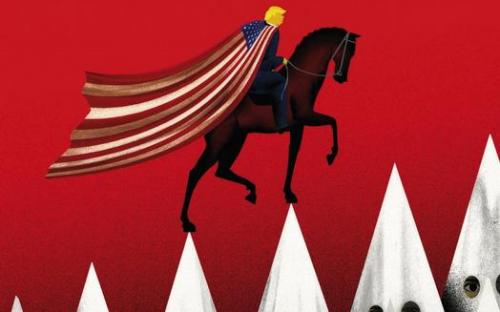One country, two pandemics
- Opinión

The management of the Covid-19 pandemic by US President Donald Trump has inevitably been installed in the American political debate ahead of the November 3rd Presidential elections.
In the new recent book by the famous journalist Bob Woodward, entitled "Rage" that was published on September 15, Woodward explains how Trump was fully informed of the seriousness of the disease from early in February, but preferred to put his political interests first and not create panic.
Trump gave precedence to the economy while praising his own management and at the same time taking importance from the threat of the virus and failing to mobilize the resources of the most powerful country in the world to protect the most vulnerable. Such an irresponsible attitude has led to the US becoming the worst affected country in the world by Covid-19 with over 200,000 deaths.
But the US President prefers not to talk about this, he ignores the figures, he despises science and hides himself by blaming China, which has once again become the ideal scapegoat. His rival, the Democrat Joe Biden, has charged him with full-blown "treason" for lying to the American people.
The first time that Trump was seen wearing a mask in public was on July 11, saying then that it was "patriotic" to use it when in previous months he proudly discouraged its use.
Aware of his actions and fragility over his response to the virus, the Republican candidate prefers to talk about something else. So he responds to protests against racism by presenting himself as a staunch defender of law and order.
Unfortunately racism in the US is much more than a public order problem and by also denying the structural racism of American society to satisfy the white supremacists whose support he needs in November.
Trump’s entire argument focuses on citizen security, however he does it is a specific way – not by looking for conciliation or acting to guarantee better security for the Afro-American population, but instead by increasing the fears millions of people of color feel every day in a country where the police stands out for its militarization and willingness to use lethal weapons with terrifying speed.
Recent research by CNN highlights that African Americans are three times more likely to be killed by the police than whites, while Harvard researchers revealed that among the deaths caused by the police in 17 US states, 32 percent were black, even though they made up only 12 percent of the population.
After the cruel murder of George Floyd in May of this year, numerous protests were unleashed in the US and in the world against continued racism and police brutality. The Floyd incident was followed by that of Jacob Blake, who was shot seven times in his back by an agent, leaving him paralyzed. And the spiral of violence was unleashed again in the absence of serious political responses and dialogue to overcome this crisis.
The combination of health and economic devastation and the emergence of anti-racism protests with the November elections on the horizon highlight the severe crisis of governance in the US. The extreme politicization of information, the increased militarization of the forces of order, the persistence of a discriminatory culture which is a hangover from the days of slavery and still inherent to the deep identity of the country, etc., make up an endogenous crisis with multiple ramifications . Although slavery was abolished more than 150 years ago and civil rights laws abolished segregationist rules and restrictions, the xenophobic attitudes behind slavery and segregation persist and in some US States there is still enormous resistance to their disappearance.
Structural racism has become a form of social organization in the US, highlights historian Valeria Carbone, who believes being black leads to vulnerability to a series of social and economic structures of subordination justified by an ideology of white supremacy.
And it is also African Americans and other minorities such as Latinos, who are suffering the worst effects of the pandemic. Not because biologically they are more prone to it, but because their location in the system and the lack of protective response accentuate their vulnerability. Floyd himself posthumously highlighted this: when his autopsy was carried out, it was discovered that he was infected with the coronavirus,
There is a Spanish saying that “We see the small problems of others, but not the big problems we have ourselves. The US is happy to issue reports on the situation of human rights, including minorities, around the world. With this, it aims to enhance a self-proclaimed ethical and moral superiority that its own internal issues put into doubt.
- Xulio Ríos, director of Chinese Policy Observatory of Spain
Del mismo autor
- El “sí quiero” de Argentina a China 11/03/2022
- La exportación del modelo chino: un argumento falaz 22/02/2022
- Self-praise or self-criticism? 01/12/2021
- Entre Taipéi y Beijing: la opción de Honduras 26/11/2021
- China celebra 50 años en el sistema ONU 19/10/2021
- China ante el AUKUS 27/09/2021
- El xiísmo cotiza al alza 09/09/2021
- Aguas armadas 10/08/2021
- Ocho tesis sobre el centenario del PCCh 24/06/2021
- Taiwán ¿un protectorado USA? 07/04/2021
Pandemia
- Gabriela Ramírez Mendoza 07/02/2022
- Jyotsna Singh 06/02/2022
- Gabriela Ramírez Mendoza 06/02/2022
- Richa Chintan 10/01/2022
- Isaac Enríquez Pérez 03/01/2022
